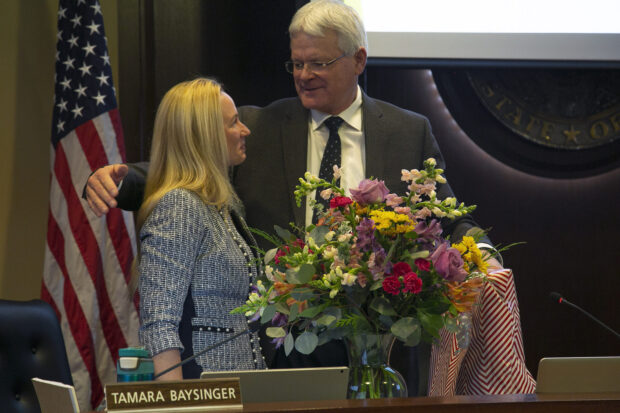BOISE — In a two-day meeting at the Idaho State Capitol, the Idaho Public Charter School Commission took on oversight of four more charter schools, approving two new schools and accepting oversight for two others that left the purview of their local school districts.
One school didn’t make the cut. In a rare move for a commission encouraged earlier this year to more rigorously vet proposals for new charter schools, commissioners on Thursday denied a petition for Pathways to Education, a proposed Idaho Falls charter school focused on underserved youth.
The commission has denied only a handful of petitions since 2006, commission director Tamara Baysinger said. And one of those received approval at a later date.
‘A significant conflict of interest’
Concerns about Pathways centered on financials.
A report from commission staff highlighted a range of “insufficient internal controls” identified in the school’s proposal.
One issue stemmed from a draft service contract between the charter and Pathways Management Group, which manages a national network of Pathways schools. Commission staff flagged a clause in the contract allowing PMG, which survives on fees based on a percentage of schools’ overall funding, to submit all of Pathway’s state reporting data.
“Because this (data) establishes revenue numbers upon which the management fee would be based, there appears to be a significant conflict of interest,” the staff report reads.
Commission staffers underscored their concerns by outlining a 2014 judgment showing that two PMG-managed schools in California had over-billed the state by more than $45 million from 2001 to 2003.
Supporters of the charter reiterated the need for a school focused on underserved youth in the Idaho Falls area, yet commissioners said PMG’s apparent risk to taxpayers outweighed the school’s potential benefits.
“I see the need for a model,” said commissioner Nils Peterson, “but have a lot of concerns.”
The commission voted 6-1 to deny Pathway’s petition. Commissioner Kathleen Kunz opposed the motion for denial.
Pathway petitioners can appeal the commission’s decision or present another proposal at a later date, Baysinger said.
Approved Petitions
The commission approved petitions for two new schools hoping to open in the Fall of 2020. Doral Academy plans to serve K-8 students in Meridian with a focus on arts-integration. Pinecrest Academy, in Twin Falls, will focus on STEAM — science, technology, engineering, arts and math.
Discussions about both schools revolved around management fees to outside vendor, Academica, which offers back-office work like bookkeeping and human resources.
Staff pointed to comparatively high annual service fees from Academica, which touts management services for over 100 charter schools nationwide. The group’s anticipated annual service fee from Doral: $300,000, or about 11 percent of the charter’s anticipated revenue at full capacity. For Pinecrest, commission staff estimated the fee would be about $22,000 or 10 percent of total anticipated revenue, at full enrollment.
Other Idaho schools that outsource back-office work pay less than $100,000 for similar services, commission staff said.
Doral petitioner Jade Millington told commissioners that Academica had recently agreed to cap the service-fee amount at 7 percent.
Commissioners went on to approve Doral’s petition 5-2, with two conditions:
- Doral trustees participate in governance orientation and training on financials, operational and academic oversight and legal compliance from commission staff.
- School staffers give the commission a facilities lease or purchase agreement, record of longterm debt incurred to date and a first-year operational budget based on enrollment estimates.
Commissioners Peterson and Brian Scigliano opposed the motion to approve Doral.
Petitioners unanimously approved the Pinecrest petition, with similar conditions. In addition to providing the condition lease and budget information, the school will have to give commissioners contracts for their outside education service costs as well.
Baysinger said the commission has seen an uptick in interest from education service providers who want to offer their services for back-end management.
These contracts do raise questions for commissioners, Reed said.
“We want to make sure the school can afford the service,” he said. “That’s the bottom line.”

Further reading: In April, National Association of Charter School Authorizers encouraged the commission to buckle down on its approval of charters. NACSA noted that the commission approved every charter petition that it has voted on in the past two years — a 100 percent approval rate. The national average is 35 percent.
Idaho Education News reporter Sami Edge contributed to this story.
